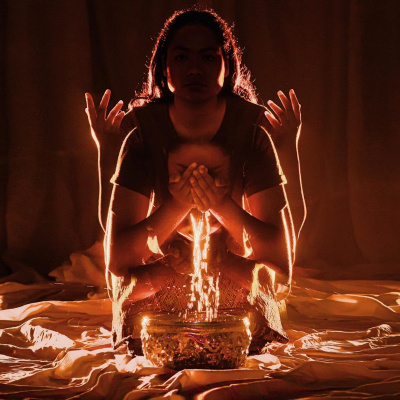MAETU
BATS Theatre, The Random Stage, 1 Kent Tce, Wellington
09/06/2021 - 12/06/2021
Production Details
Watering lemongrass, staring at a screen and walking through empty hallways – a day to day ritual.
As Maetu sits in her little green house she strings back memories through her household objects that have brought her to where she is now.
This is an abstract and imagery-based piece that tells the story of a wonderful grandma.
BATS Theatre, The Random Stage
9 – 12 June 2021
8:30pm
The Difference $40
Full Price $20
Group 6+ $18
Concession Price $15
BOOK TICKETS
Accessibility
The Random Stage is fully wheelchair accessible; please contact the BATS Box Office by 4.30pm on the show day if you have accessibility requirements so that the appropriate arrangements can be made. Read more about accessibility at BATS.
Theatre ,
1 hr
Mesmerising, moving – shows us how the mundane becomes beautiful
Review by Lynda Chanwai-Earle 10th Jun 2021
First impressions are vital, and upon entering BATS theatre I’m struck by a familiar aroma that’s so familiar (as an Asian), that I almost don’t recognise it at first. It’s the smell of cooking rice.
Maetu is the Lao word for ‘grandmother’ and creator Shanaia Boutsady has captured her real-life grandmother and her intimate family drama in this powerful work-in-progress theatre piece. Boutsady herself sits centre stage in traditional Lao clothing, holding a rice pan, sifting, sifting gently. As we filter in to take our seats we hear the gentle swish, swish of rice being washed mingling with early morning cries of a rooster and Lao voices calling to each other. We are transported back in time to Boutsady’s family village in Laos.
This is the world premiere of Aotearoa’s first Lao/Thai theatre with the KIA MAU Festival of indigenous live performance. Boutsady’s poetic, abstracted and non-linear play takes place on a bare stage surrounded by three huge white sheets. Her soundtrack is sourced from real audio of village life back home. The sheets translate effectively as membranes of memory, or literal walls as the shadow play of performers ripples across them. They become the distance dividing family, or simply bed linen as a family member wakes up to start her mundane, daily rituals.
Two more women enter, dressed as Boutsady is. They sit alongside and enact domestic rituals together. Performers Christine Chanthaboury and Khanie Vongboutdy, along with Boutsady’s Aunt Soulivone Phonevilay make up the all-Lao cast.
Born and raised in Glen Eden, Auckland, Boutsady is of Laos, Thai, and Nga Puhi descent and the creator behind this entire world. She directed, set-designed and is on stage performing alongside members of her own community. But Boutsady didn’t create her world in a vacuum.
Aunt Soulivone taught Boutsady the traditional Lao dance movements, before taking her to the Lao Buddhist temple in Porirua to seek a blessing from the monks. This blessing enabled the scene of the temple rituals to take place on stage with real artifacts. Boutsady acknowledges with gratitude, the generosity of her community in supporting her to tell this universal story of migrant resettlement.
Maetu is distinctly separated into three acts, signified by the audio-visual footage projected onto the voluminous white sheets. The first act shows us life in Laos before the violent Communist regime. Morning prayers take place inside the Buddhist temple, followed by washing and cooking together, women gathered to gossip in the heart of the village.
The soundtrack and dialogue are completely Lao apart from snippets of historic news footage shot in Laos, and Boutsady’s poetic voiceover spoken in English. The poetry expresses her inner angst as the artist, exploring her own cultural heritage for the first time. Here she guides the English-speaking audience through her own complex emotional journey as the daughter and descendant of the Lao/Thai diaspora in Aotearoa.
Act Two and civil war: the mass exodus of Boutsady’s people from their homeland is portrayed through a violent red, in which each performer stands and confronts the audience. There’s no dialogue, just a piercing gunshot. Boutsady’s grandmother and mother fled Laos as former refugees, arriving in Auckland in 1980.
Maetu speaks volumes about family grief, intergenerational relationships and the universal through the culturally specific with intimate insights into Aotearoa’s Lao/Thai community, and ultimately their migrant resettlement struggle as former refugees from the brutalised Laos of the 1970s.
Act Three shows us life in Aotearoa. Poignant impressions of the cold, simply relayed by each woman clothing the other in a jacket. Distinct calls of Tui and audio of footsteps on hard wooden floors, no more bare feet or swishing of rice.
Post show, one audience member criticises Boutsady for not having subtitles, for not translating the Lao into English, for the perceived language barrier. However, it is clear that Boutsady’s instinct is to honour and prioritise her indigenous Lao in performance, and as an audience member, none of the important context was lost on me, nor on the aunties sitting in front of me.
Boutsady’s maetu (grandmother), Sithat, flew down from Auckland specially to see her granddaughter’s debut. Sitting with other elderly Aunties in the front row, they laugh, they frown, and they clutch each other at pivotal moments. “This is our story,” one Aunty says to me afterwards.
This is a work in progress, and some elements of the audio-visual feel rough and overstated, but ultimately Maetu shows us ways to resolve the lack of Asian representation on stage by honouring the language, culture and history unapologetically. Boutsady has created an authentic voice for her people.
Mesmerising, moving, Boutsady shows us how the mundane becomes beautiful in this important world premiere of Aotearoa’s first Laos/Thai theatre piece.
Copyright © in the review belongs to the reviewer







Comments